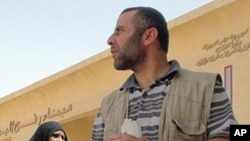Humanitarian aid is entering the Gaza Strip after Egyptian President Hosni Mubarak ordered the opening of the Rafah border crossing with the Palestinian territory. But few Palestinians are able to take advantage of the chance to enter Egypt.
Moustafa Youssef needs help hauling his suitcase across the no-man's land between Egypt and Gaza. He has a long-standing heart condition, which normally is a liability. But in Youssef's case, he has medical permits letting him leave Gaza.
Seeking refuge from the blistering sun in the shadow of the crossing wall, he has nothing but praise for the country he has just entered.
He asks God to protect Egypt, saying that for Gazans "it is the only lung we have to breathe with." Without Egypt, he says, it is like living in a zoo - "We cannot move."
With the 1.5 million Palestinians in Gaza under blockade, Egypt is a sporadic lifeline, with brief openings coming every month or so. But after Israel's raid on a flotilla trying to break the siege, Egypt, caught between its relations with Israel and the anger of other Arab nations, says Rafah would stay open indefinitely.
There are limits to who and what can pass - mainly people with medical emergencies and deliveries of humanitarian aid.
At the border, Red Crescent trucks stacked with blankets, food and medicine idle as aid workers wait for clearance to pass through.
Ordinary Palestinians returning home take the opportunity to bring in other goods. Ashraf el Najar is driving a pick-up truck loaded with an electric fan, a refrigerator and other household goods.
Najar says he accompanied a relative for medical treatment in Cairo. He bought the appliances on the way back, he says, because his house in Khoza'a, near Khan Younis, was demolished during the last Israeli attack on Gaza.
He is referring to Israel's war last year against Hamas militants. While Israel has deplored Hamas attacks on Israeli territory, Egypt also takes a dim view of the group, which runs the region along its border. The group's rise to power in 2007 prompted Egypt, which is wary of like-minded Islamists at home, to say it would only deal with the ousted Palestinian Authority on the border issue.
While the problem of the blockade continues to be debated at higher political levels, those most affected try their best to work around it.
A young mother stands with her five-year-old daughter here at the eastern edge of the Sinai, waiting to return to their home in Gaza. The little girl has a patch over one eye, evidence of a recent operation to correct a damaged nerve.
Her mother says help is not available in Gaza, so for a year she asked for permission to take her daughter to Jerusalem, but with no success. She too is grateful for Egypt's current opening of the border, but she says she wants it to be permanent. Her daughter needs to come back for follow-up treatment next month, and she says she worries that the border will be closed.




